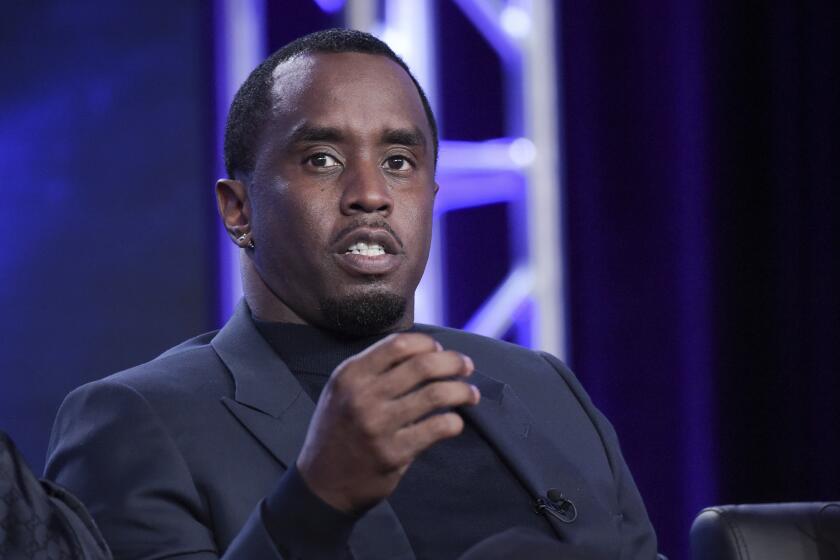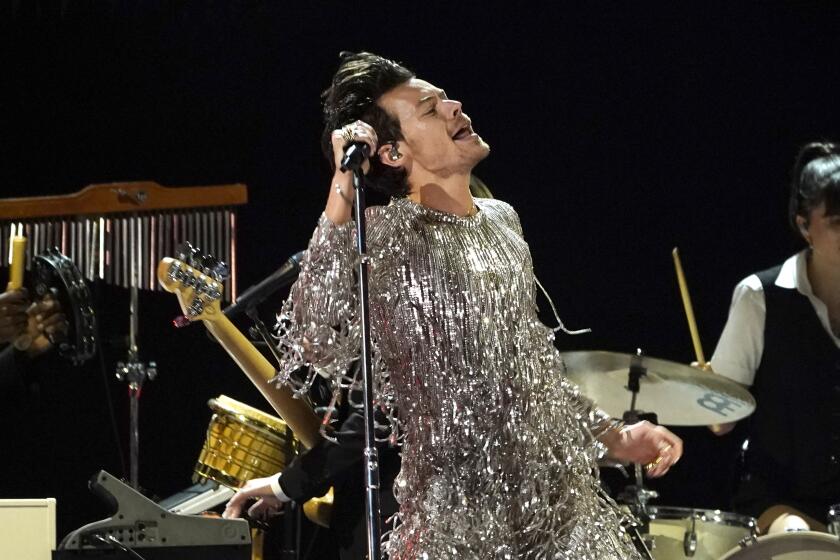Ertegun Aims to Put Back Jazz Groove in Atlantic
The list of artists under contract reads like something from a who’s-who of jazz: John Coltrane, Charles Mingus, Ornette Coleman, Rahsaan Roland Kirk and the Modern Jazz Quartet, to name just a few.
In the ‘50s and ‘60s these giants of the music recorded for one company: Atlantic. Combine that roster of much-admired cutting-edge recordings with successful crossover outings by Herbie Mann, Charles Lloyd and Eddie Harris, and one could make the case that for a period of time, Atlantic had the strongest lineup in jazz. “Jazz,” says Ahmet Ertegun, founder of Atlantic Records and co-chairman/co-CEO of the Atlantic Group, “has always been an important part of our company.”
Well, yes and no. In recent years and for a variety of reasons, mainly economic, Atlantic’s jazz predominance has clearly diminished and the music no longer plays the vital role it once did in the company’s planning.
But last month, the company took a giant step toward bringing it back by announcing a major reorganization of its jazz activities, in which Ertegun would directly oversee the musical direction of the label’s jazz program.
The move by a major record company’s co-chairman/co-CEO into the front line of action is not exactly an everyday occurrence in the music business, even for an executive who has not been an especially noticeable participant in Atlantic’s recent pop music projects.
And the question is why Ertegun, a near-legendary recording business veteran who propelled Atlantic from a one-room operation in the late ‘40s to a major international entertainment company, would choose to take such a hands-on role. Jazz, after all, despite its unquestioned significance as a unique American creative invention, simply doesn’t sell as many albums as, say, Hootie & the Blowfish.
Ertegun, speaking by phone from his New York office, chuckles in response to the comparison. “Perhaps not,” he says, “but the fact is that jazz has always been my favorite music.
“And don’t underestimate its sales potential. A jazz musician is like a painter. In the beginning, their work may not sell for much money. When we first released our Coltrane albums, they didn’t sell in huge numbers. But there was tremendous excitement about them, and that excitement grew and grew as time passed. Take a record that sold 40,000 or so when it first came out, and if you look at the sales now, it’s up to around 1.2 million. It’s like classical music; it’s catalog, and it grows and grows.”
An equally important--if less commercially relevant--rationale for Ertegun’s direct involvement with a revitalized jazz program at Atlantic may be the fact that most of the label’s classic recordings were produced under the supervision of his late brother, Nesuhi. It’s a legacy that Ertegun clearly values and intends to honor.
Despite his obvious enthusiasm, the history of jazz is littered with the shambles of programs, especially at the major labels, that were heralded with massive promotional trumpeting, only to fade away with barely a whimper.
Last year, for example, one of the major labels unceremoniously discarded several of its younger jazz acts. Nor has Atlantic done a particularly good job of handling its own players. Pianist Cyrus Chestnut, one of the company’s most important young artists, was initially introduced to the Los Angeles press in 1994 at an out-of-the-way club in Los Feliz. (Perhaps in response to Ertegun’s newly influential role in Atlantic’s jazz program, Chestnut was once again presented to the L.A. press earlier this month, this time at an upscale West Hollywood restaurant.)
*
Ertegun is the first to acknowledge that there have been problems with the jazz side of the business. “For too long now,” he concedes, “the jazz department has been sort of run ad-lib by various people here who are interested in jazz. But there’s been no real focus. We’ve allowed it to fall into secondary importance. And it’s time to bring it back.”
Will Atlantic fall victim to the too-familiar major label jazz pattern of promising much and delivering little? Ertegun thinks not, pointing out that the success of the program is dependent upon a very personal chain of command.
“Look at it this way,” he explains. “Jazz at Atlantic will get the support that I, as head of the jazz department, can convince myself, as co-chairman of the company, to provide.”
Yves Beauvais, vice president of artists and repertoire for jazz, underscores what he believes are elemental changes in the way Atlantic now plans to handle the music.
“We’re bringing it right into the mainstream activities of the company,” Beauvais says, “which is really kind of a first. Up until now, it has been fairly ghettoized: A small department took care of jazz, and that was the end of it. With this reorganization, the same product managers who are responsible for, let’s say, Hootie & the Blowfish or Brandy are assigned one or two of our jazz artists to work alongside their big mainstream projects.”
In essence, this means that Atlantic’s jazz performers will receive the same marketing techniques--samplers, in-store appearances, airline audio exposure, promotion and public relations assistance--that pop acts receive.
It’s unlikely that either Ertegun or Beauvais would be expressing so much optimism if they did not feel that the jazz revival of the ‘90s was on firm footing.
*
Ertegun, taking a parochial viewpoint, notes that Atlantic is filled with jazz enthusiasts: “I was surprised to see how many there were, in promotion, in sales, in marketing.
“Even our legal department,” he adds with a laugh, “has a lot of jazz fans.”
Beauvais, who spends a great deal of his time (“almost every night”) going to showcases, jazz clubs and jam sessions in search of new talent, sees an even wider audience demographic for the music.
“When I first came here from France 16 years ago,” he says, “the jazz club audiences were mostly Japanese tourists and older people. But these days I go to jazz clubs and I see an enormous number of young kids.”
Atlantic’s well-balanced roster includes a solid lineup of talent--Chestnut, James Carter, Wes Anderson, Wycliff Gordon--already connecting strongly with younger listeners. Among the contemporary-style acts are such established performers as Harvey Mason, Gerald Albright, Mike Stern, Bobby Lyle and Jean-Luc Ponty.
In addition, Ertegun notes, a number of special projects is in the works.
Later this year, there will be a new Ginger Baker trio record, featuring Charlie Haden. And there are plans to put together a Modern Jazz Quartet album in which the venerable ensemble will work with a number of guest vocalists.
“We’re also going to do a big-band album with Phil Collins,” Ertegun says. “He’ll be playing drums for a short tour of Europe and the Montreux Jazz Festival, where the band will be conducted by Quincy Jones. We’ll record them on the road and possibly in the studio.”
Ertegun raises one flag of caution, however, about the company’s jazz expansion.
“The way we do things traditionally here at Atlantic,” he explains, “is to feel some kind of reaction from the field that tells us this is a record that people like. Then we put our whole company’s power behind the record. But you can’t flog a dead horse. If there’s no reaction to a record, then it doesn’t do any good to scream and yell about it.”
But he and Beauvais are convinced that they now have or soon will sign artists who, in Beauvais’ description, can “speak to your heart very clearly.”
Obviously pleased to be back in close touch with the music, Ertegun, sounding eager and invigorated by the prospect, adds, “This is definitely a time of renewed commitment at Atlantic when it comes to jazz. Now it’s up to us to find the right people to create great music.”
More to Read
The biggest entertainment stories
Get our big stories about Hollywood, film, television, music, arts, culture and more right in your inbox as soon as they publish.
You may occasionally receive promotional content from the Los Angeles Times.






